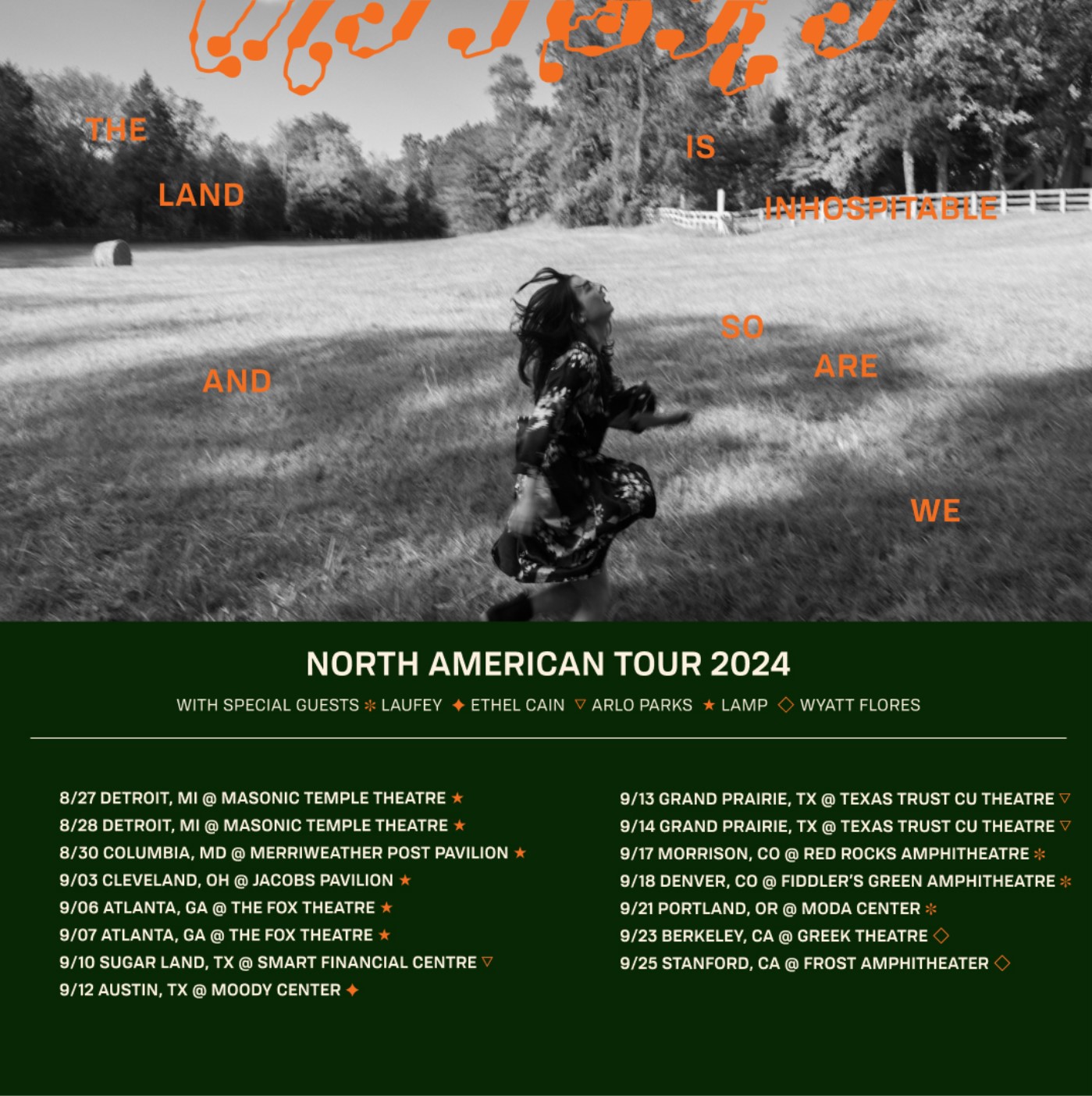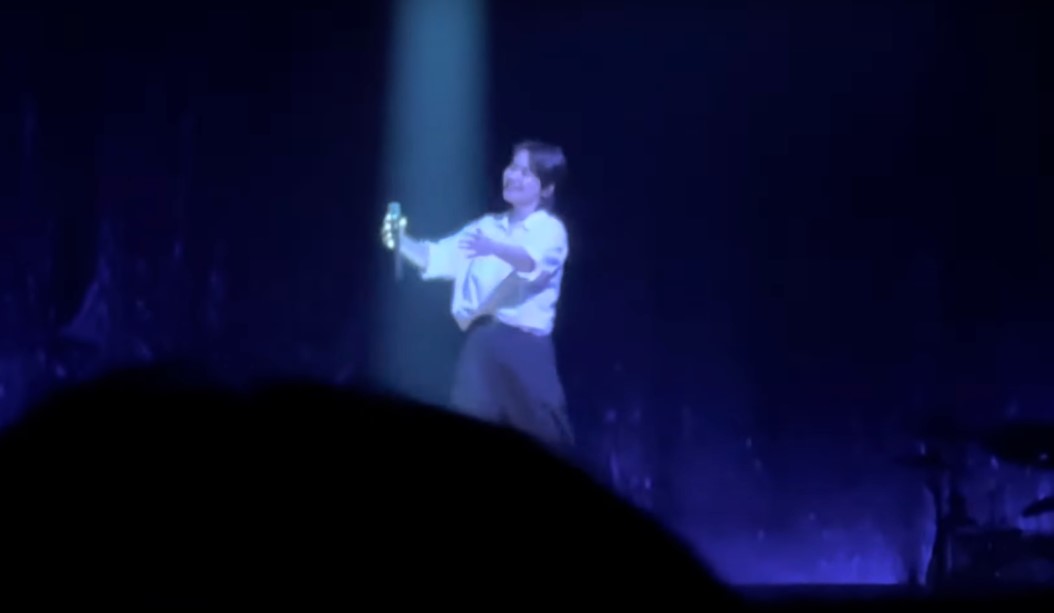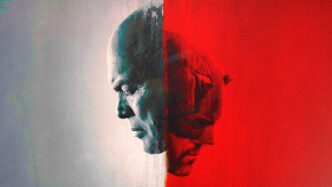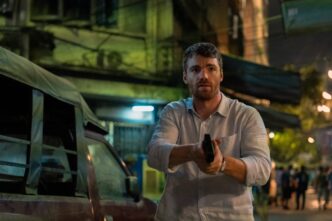Mitski’s album The Land is Inhospitable and So Are We turns one, and its creator, Mitski, turned 34 this September. The North American leg of her tour also concluded two days before her birthday. On these multiple joyous occasions, let’s take a deep dive (sorta) into singer-songwriter Mitski.

“I’ve never actually written a real love song. I think in my music, when I’m talking about love, I’m rarely talking about real love. I’m mostly talking about power, fixation, and loss. All of these come in the form of love, in the form of relationships.”
This might come as a surprise to some people who are casual listeners of Mitski or prefer to interpret songs in their own way rather than how the artist intended. Both approaches are completely valid. In fact, I was one of them too.
I got introduced to Mitski during lockdown. The second song I heard—and the first I fell in love with immediately—was “Your Best American Girl.” The quiet, soft melodic verses building up to an intense explosive chorus left me speechless for a while. I fell down the rabbit hole, exploring the complex, beautiful mind of Mitski.
“Your mother wouldn’t approve of how my mother raised me, but I do, I think I do. You’re an all-American boy, I guess I couldn’t help but try to be your best American girl.”
I love music. I love listening to it, spending hours obsessing over a single lyric, melody, or guitar riff. Music has the power to impact me more than anything else. However, I’m not well-versed in its technicalities. I don’t know chord progressions, musical arrangements, or the complicated software behind it. If I love it, I love it. When it comes to songs, lyrics have always mattered most to me, followed by melody, then production and arrangement.
The chorus of “Your Best American Girl” features some of the most gut-wrenching lyrics I’ve come across. Trying to change yourself for the person you love to the point of destroying your roots until you become unrecognizable is a powerful theme. And, of course, the over-glorification of America adds another layer.
Many of us grow up with relatives and peers feeding us the American Dream, encouraging us to aim for it as we grow older, as if our lives will be complete once we settle in America. But once we get there, the color of our skin betrays us, revealing that we are “not American enough.”
Mitsuki Miyawaki, born in Mie, Japan, is of half-Japanese and half-American descent. Like many mixed-race children, she never truly felt like she belonged to either identity. In trying to become the best American girl for the person she loved, she realized she had internalized a hatred toward her own identity. She expresses this complex emotion in a single, simple line.
That’s what Mitski does. Her songs rarely exceed the three-minute mark, yet she conveys more in that time than many artists do in 10-minute versions of their work. Part of this comes from not including overly specific details, easter eggs, or shade that gets people speculating and creates drama over the singer’s personal life.
“People say that my songs are too short, but it’s like… this is what I had to say, and it’s over. Let’s not add any more stuff.”
Artists often lose their artistic integrity trying to cross an invisible threshold to please the masses—or sometimes, their label. Mitski’s first two albums, Lush and Retired from Sad, New Career in Business, were self-published in college. Only five of the 18 songs exceed three minutes, yet each is a masterpiece. The pattern continues in her following albums.
Returning to the topic of love songs and songs not crossing the three-minute mark: one of the most beautiful love songs I’ve ever come across—aside from its namesake by the Beatles, “A Pillow of Winds” by Pink Floyd, “Helplessly Hoping” by Crosby, Stills & Nash, or the recent but heartwarming “No Machine” by Adrianne Lenker—is Mitski’s “I Will” from Bury Me at Makeout Creek. It stands just short of the three-minute mark at 2:53.
“I will wash your hair at night, and dry it off with care. I will see your body bare, still I will be here. Stay with me, hold my hand. There’s no need to be brave.”
I could quote the entire song, given how pure and heart-wrenching it is in its mundanity. However, I’ll leave you to listen to it yourself to fully grasp its magnificence. But that just shows how surprised I was to learn that Mitski had never written a love song before.
“I Will” was written from the perspective of the “other person.” It’s what Mitski longs to hear from her lover. Whether it’s “Once More to See You,” which talks about a hidden love because it’s frowned upon—”But with everybody watching us, our every move, we do have reputation”—or “A Loving Feeling,” where she sings, “What do you do with a loving feeling when you only love me when we’re all alone?” Mitski explores multifaceted, unique perspectives on love and relationships.
Themes of desperation, self-destruction, and obsession run deep in Mitski’s lyrics. But it’s true that she had never written a song about being in love and in a good place. Fast forward five years, and the dreamy, theatrical ambiance of her third single from her seventh album, The Land is Inhospitable and So Are We, took us to another dimension, with the soft “ooh ooh ooh ooh” amplifying the feeling of being transported to “heaven.”
“The dark awaits us all around the corner. But here in our place, we have for the day. Can we stay awhile and listen for Heaven?”
Mitski has stated that she wanted to write “a genuinely romantic song,” which she succeeded at. Patrick Hyland, her long-time collaborator who has produced all but one of her albums, called it one of the greatest songs she’s ever written. And I agree.
I imagine hearing this song live would be an idyllic, almost religious experience. Mitski has always incorporated theatrics into her performances, regardless of scale. Even when she wasn’t as big, simple acts like screaming into a guitar while asking her mom to wash her back—just this once, and she’ll give up chasing her dreams—made her performances intensely powerful.
Now that she can, in her words, “afford a taxi” and has entered the billion-stream club, Mitski has upped her game. Her current tour uses light, shadow, and brilliant choreography to make each show unforgettable. Heaven, in particular, features the spotlight as a dance partner.

Additionally, Mitski incorporates a Japanese theatrical dance style into her performances, featuring slow, hyper-controlled motions (ankoku butõ), as explained by her choreographer, Jas Lin. Mitski wants the audience to feel like the performance is their own space, their own ritual.
However, this approach hasn’t always translated well when she opened for larger, more mainstream, and “white” pop artists like Harry Styles, where she was often ridiculed online. She also faced backlash for asking people not to record entire songs, as it disrupted the flow of the performance. The public often dislikes it when artists draw boundaries, feeling entitled to their lives and privacy the moment they become famous.
A similar situation arises with Chappell Roan, who has also set boundaries regarding fan and paparazzi interactions. Roan, only slightly more than a year into her career, has compared fame to an abusive ex-husband—mentioning stalking, online hate, and public harassment. The internet hasn’t taken kindly to this.
Some celebrities have applauded Roan for standing her ground, including Mitski, who reached out to her, saying: “I just wanted to humbly welcome you to the shittiest exclusive club in the world, where strangers think you belong to them and they find and harass your family.”
Mitski has managed to stay relatively out of the public eye. There haven’t been any major scandals, dating rumors, or paparazzi photos. Most of this can be attributed to her more mature fanbase. She’s only recently become “TikTok famous,” with songs like “Me and My Husband,” “Washing Machine Heart,” and her biggest hit yet, “My Love All Mine,” from her latest album.
Before TikTok, Mitski was beloved on Tumblr, where fans didn’t try to decode her songs for hidden clues about her personal life. Instead, they simply cried over them. Still, her music has often been reduced to “sad girl music,” a label that has only intensified over time.
This brings me to an important question: Does music always have to be autobiographical?
I recently read an article in The Atlantic about the impulse to undermine women’s fiction. While this tendency isn’t exclusive to women in the music industry, it’s undeniable that women are disproportionately harassed about it. People struggle to take music at face value—they feel compelled to know who it’s about and how it relates to the artist’s life. Some celebrities normalize and capitalize on this, and if the biggest pop star in the world is doing it, it must be the norm, right?
Mitski has expressed her frustration with this trend, explaining that she doesn’t like her music being interpreted as autobiographical, as if women lack the imagination or creativity to come up with something fictional. Music doesn’t automatically mean it’s based on true events, and I understand her perspective.
Storytelling has always been central to Mitski’s music. Whether she’s titling songs after names like “Abbey,” “Eric,” “Dan the Dancer,” or “Francis Forever,” or writing about trying to be happy in an emotionally empty marriage, stories are a constant in her work.
Mitski has mentioned that she pinpoints emotions from seemingly mundane events and then exaggerates them into fictionalized stories—because otherwise, they wouldn’t make for great songs.
In fact, I’d imagine it’d be quite annoying if people thought I was leading a double life with a husband and kids just because I wrote a song with that theme. But the music industry is invasive like that.
It’s remarkable that, unlike some celebrities, Mitski hasn’t simply accepted this reality. She has spoken out against the industry’s bad practices. She doesn’t believe that you have to be miserable to create good art, explaining that perpetuating this idea allows the industry to maintain poor working conditions and exploit artists. While Mitski loves music and it’s the most important thing in her life, she acknowledges that it’s still just work.
“I used to rebel by destroying myself, but I realized that’s awfully convenient to the world. For some of us, our best revolt is self-preservation.”
Music is a job, and you shouldn’t allow yourself to be consumed by it. We emphasize work-life balance in every other sector, so why not for musicians? We should have learned something about the negative effects of overexposure and invasiveness from Amy Winehouse—or, you know, basic common sense. The whole 27 Club exists because of the over-glorification, pressure, and harassment that come with fame, yet these problems persist.
Public reactions to instances like Chappell Roan’s further highlight the parasocial behavior and entitlement people feel toward celebrities. Instead of respecting boundaries, they chastise artists for not responding to harassment with gratitude and a smile.
Part of why I love Mitski, among thousands of other reasons, is how human and grounded she is. Seven albums in, at the height of her career, she remains the same person she’s always been.
Her roots and motivations aren’t exaggerated for marketing purposes. She began making music at 17 after trying everything else and realizing that music fit her the most.
Her goal has always been to express herself. Initially, she didn’t care about chords or big productions; she preferred lyrics and melody and wanted people to be able to sing along. According to her, “Anyone can sing,” and she’s often seen giving lessons on how to scream in concerts while preserving your voice (spoiler alert: it’s about screaming from your diaphragm, not your throat). And, of course, there’s the fact that after 11 years in the industry, Mitski has successfully avoided “selling her soul” and compromising her principles for fame.
I could rant endlessly about what else I love about Mitski because, trust me, I’ve barely scratched the surface. If I started talking about her lyrics, it would take me hundreds more pages. But I suppose this is a good starting point. If you’d like to hear about my personal favorite Mitski songs, you can check them out and listen to them ranked in this playlist I made. I might write a part two if you like this enough—so I hope you enjoy!






